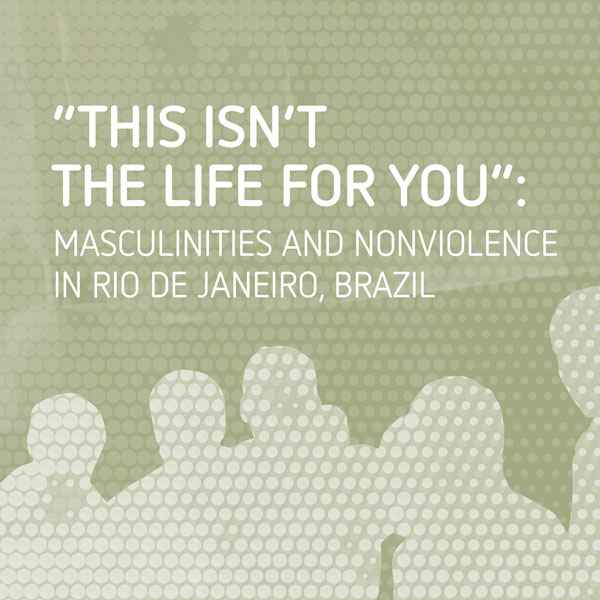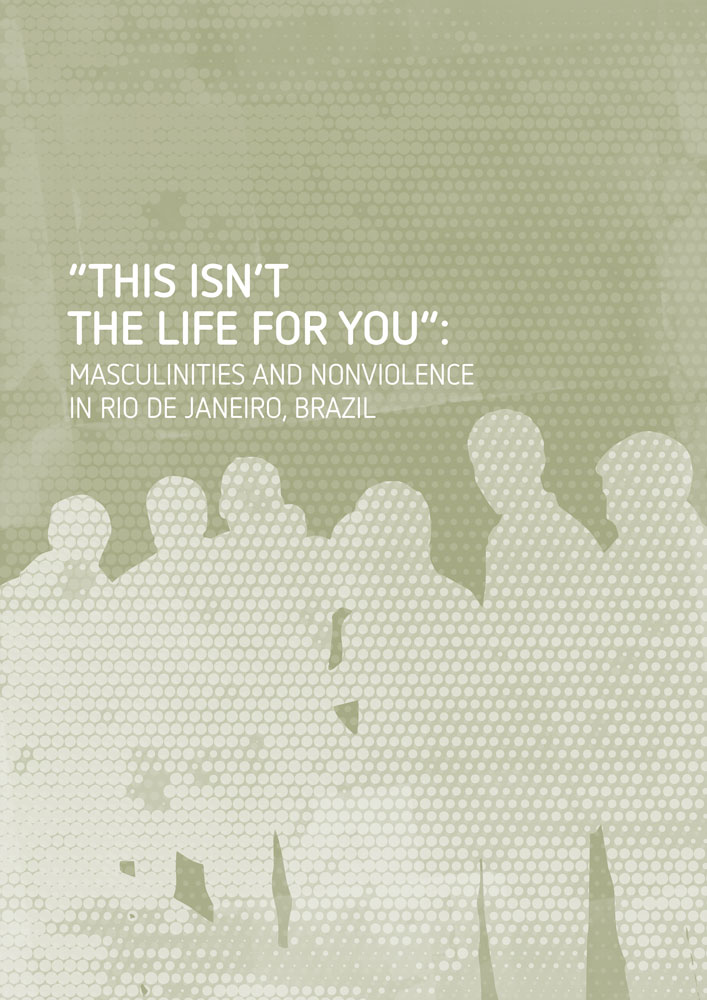“This isn’t the life for you.” These words helped a man who worked in the drug trade to become a community activist, and they capture the aims of Equimundo’s new report, “This isn’t the life for you.” Masculinities and Nonviolence in Rio de Janeiro, Brazil.
The report, produced by Equimundo for the Safe and Inclusive Cities (SAIC) global research program, presents the results of an adaptation of the International Men and Gender Equality Survey (IMAGES) in Rio de Janeiro. It reveals new findings on gender, masculinities, and nonviolent trajectories in the context of urban violence, including the interactions between violence in public and private spheres.
The report’s title was inspired by the story of the man mentioned above who lives in a favela in Rio de Janeiro. He explained during a qualitative interview that these words, “This life isn’t for you,” came from a peer within his drug trafficking group while watching him play with a child. Soon after, he left the drug trade and ultimately became an activist. He was one of 45 respondents in the study’s in-depth qualitative interviews, in addition to more than 1,151 who participated in quantitative interviews, which were carried out in the city of Rio de Janeiro between 2013 and 2016.
The study finds that homicide and other forms of violence persist at high levels in favelas and other low-income settings in Rio de Janeiro, and – as much research has already shown – this violence overwhelmingly affects low-income, young, black men. The survey includes interviews with respondents from two samples, roughly corresponding to the city’s southern zone, where homicide rates are lower, and the city’s northern zone, where homicide rates are higher.
Results show that men’s exposure to urban violence before age 18 is strongly linked to their later use of violence – including gender-based violence – as adults. An average of 82.8% of the men interviewed had experienced or witnessed at least two of the following before age 18: aggravated assault, violent treatment by the police, battering, exchange of gunfire, house or workplace hit by bullets, death threats, or being shot by a firearm.
At the same time, nearly 95% of men surveyed viewed gun ownership and use favorably, although a relatively small proportion of individuals reported that they owned or had ever used firearms. Women had less favorable attitudes toward firearms, but over 70% of all female respondents reported supporting gun ownership and use.
“We know how guns contribute to the symbolic construction of traditional masculinity,” said Tatiana Moura, executive director of Instituto Equimundo. “A gun in the home greatly increases the probability of the murder of – or violent threats against – a man’s partner. However, we cannot look at this problem as just a domestic issue. It has everything to do with our public policies – for example, the discussions around Brazil’s Disarmament Statute, which is being attacked but must not suffer setbacks.”
The study also analyzed respondents’ fear of violence. A high percentage of respondents reported fear of the police (59% in the North; 53% in the South), of the militia (53% in the North; 44% in the South), and of drug traffickers and dealers (58% in the North; 42% in the South). Among respondents, however, fear of burglars was the greatest (78% in the North; 47% in the South).
Factors That Reduce Violence
While the study’s quantitative household surveys were conducted with local men and women from different areas of Rio de Janeiro, the 45 qualitative interviews focused on men and families – including former drug dealers, police officers, activists, and their partners – who had chosen trajectories of nonviolence amidst groups in which they are encouraged to use violence.
Fatherhood emerged as a central factor in directing a man’s life trajectory away from violence and toward nonviolence. Other factors associated with nonviolent trajectories included: men’s participation in domestic tasks; connection to social support circles; educational attainment; use of mechanisms to “cool down” and step away from conflict; broader life perspectives and greater urban mobility; individual traits such as emotional and pro-social skills, resilience, and motivation; and rejection of masculine norms tied to violence and the adoption of more gender-equitable attitudes and behaviors.
The report also points to the need to adopt a new public security agenda that works to build more secure, inclusive cities. Decision-makers must adopt policies that overcome Brazil’s current model of policing and instead prioritize violence prevention and conflict mediation more broadly.
“We must move beyond the punishment of individuals. We have seen that this type of policy does not solve the problem; what’s more, it does not give young people and adults a second chance. We believe in resilience, in positive attitudes, and in paradigm shifts,” Tatiana Moura said. “Creating integrated public security policies that work in both public and private spaces is an important step forward.”
Read the full report here.

